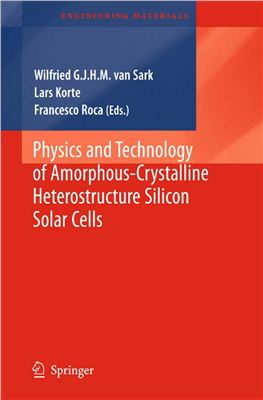Springer-Verlag Berlin, 2011, 579 pages
Today’s solar cell multi-GW market is dominated by crystalline silicon (c-Si) wafer technology, however new cell concepts are entering the market. One very promising solar cell design to answer these needs is the silicon hetero-junction solar cell, of which the emitter and back surface field are basically produced by a low temperature growth of ultra-thin layers of amorphous silicon. In this design, amorphous silicon (a-Si:H) constitutes both „emitter and „base-contact/back surface field on both sides of a thin crystalline silicon wafer-base (c-Si) where the electrons and holes are photogenerated; at the same time, a-Si:H passivates the c-Si surface. Recently, cell efficiencies above 23% have been demonstrated for such solar cells. In this book, the editors present an overview of the state-of-the-art in physics and technology of amorphous-crystalline heterostructure silicon solar cells. The heterojunction concept is introduced, processes and resulting properties of the materials used in the cell and their heterointerfaces are discussed and characterization techniques and simulation tools are presented.
Today’s solar cell multi-GW market is dominated by crystalline silicon (c-Si) wafer technology, however new cell concepts are entering the market. One very promising solar cell design to answer these needs is the silicon hetero-junction solar cell, of which the emitter and back surface field are basically produced by a low temperature growth of ultra-thin layers of amorphous silicon. In this design, amorphous silicon (a-Si:H) constitutes both „emitter and „base-contact/back surface field on both sides of a thin crystalline silicon wafer-base (c-Si) where the electrons and holes are photogenerated; at the same time, a-Si:H passivates the c-Si surface. Recently, cell efficiencies above 23% have been demonstrated for such solar cells. In this book, the editors present an overview of the state-of-the-art in physics and technology of amorphous-crystalline heterostructure silicon solar cells. The heterojunction concept is introduced, processes and resulting properties of the materials used in the cell and their heterointerfaces are discussed and characterization techniques and simulation tools are presented.

